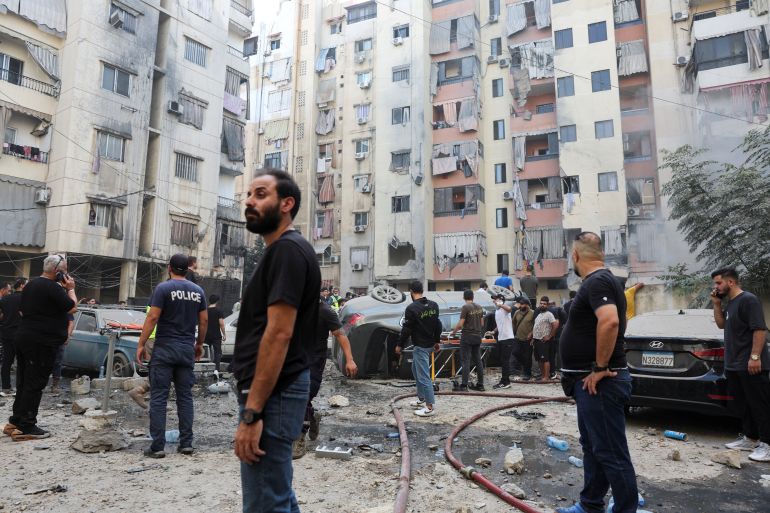DEVELOPING STORYDEVELOPING STORY,
Israeli air attack on Beirut kills three as cross-border fire intensifies
Israel and Hezbollah trade intensified fire across Lebanon-Israel border as fears grow of a full-blown war.
People inspect the site of an Israeli attack in the southern suburbs of Beirut, Lebanon [Mohamed Azakir/Reuters]Published On 20 Sep 202420 Sep 2024
Lebanon’s health ministry says at least eight people have been killed and 59 wounded in an Israeli air attack on a southern suburb of the Lebanese capital, Beirut.
Lebanon’s National News Agency (NNA) reported that five children were among the casualties from the attack on a building in Jamous Street, southern Beirut, on Friday.
The agency said that a F-35 jet hit the residential area with two attacks.
The Israeli military said it has carried out a “targeted strike” in the Lebanese capital, claiming to have hit near key Hezbollah facilities in Dahiyeh.
“The [Israeli military] conducted a targeted strike in Beirut. At this moment, there are no changes in the Home Front Command defensive guidelines,” it said, providing no further details.
Al Jazeera’s Zeina Khodr, reporting from Beirut, said Dahiyeh is considered a Hezbollah stronghold.
“This is a major escalation. We are getting reports this could be a targeted assassination,” she said.
“It is not the first time that Beirut’s southern suburb is targeted, but images emerging from the scene show a building almost totally destroyed, so it is likely there will be civilian casualties.”
Zein Basravi, reporting from Amman because Al Jazeera is banned in Israel by the government, said Israeli media have been reporting that a very senior official of Hezbollah was the target of this attack.
“The Israeli army has put out warnings to the Israeli people, saying everything is on the table and to be prepared,” he said.
“There are now renewed calls for people to stay near bomb shelters.”
Hezbollah fires dozens of rockets
Earlier on Friday, Hezbollah pounded northern Israel with 140 rockets, a day after the group’s leader Hassan Nasrallah promised to retaliate against Israel for a mass bombing attack, the Israeli military and the Iran-backed group said.
Israel’s military said the rockets came in three waves on Friday afternoon, targeting sites along the ravaged border with Lebanon.
Tensions between Israel and Hezbollah have soared following two days of sabotage attacks blamed on Israel that set off explosives in thousands of communications devices, killing at least 37 people and injuring nearly 3,000 people, including civilians.
But Hezbollah said the rockets were in retaliation for Israeli attacks on villages and homes in southern Lebanon.
The group said it launched “salvoes of Katyusha rockets” against at least six Israeli “army headquarters” and bases, including a “main air defence base”.
“Some 140 rockets were fired from Lebanon within an hour starting at 1:02pm (10:02 GMT),” an Israeli military spokesperson told the AFP news agency on Friday.
Israeli public broadcaster Kan put the number of rockets at about 150.
Smoke billows from the site of an Israeli air strike on Lebanon’s southern village of Kfar Kila, on September 20 [Rabih Daher/AFP]
Videos from northern Israel posted online showed rockets being intercepted by Israel’s Iron Dome system, as sirens were heard in the background.
The Israeli military claimed the barrage of rockets caused no injuries and that rescue services were working to put out fires sparked by falling debris.
It listed the targeted areas as the occupied Golan Heights, the Upper Galilee region and the town of Safed.
The military said its air defences took down some of the rockets, while others fell in open areas.
The incoming fire came after the Israeli military said it struck dozens of rocket launchers overnight that were ready for use against Israel.
For nearly a year, Hezbollah has engaged in near-daily exchanges of fire with Israeli forces along the Lebanon-Israel border in support of Hamas.Tens of thousands of people on both sides of the border have also been forced to flee their homes due to the fighting.
Khan described the overnight attacks by Israel in Lebanon as the “largest” since hostilities began in October, following the Hamas-led attack in southern Israel that triggered its war on the Gaza Strip.
Sami Nader, director of the Levant Institute, said that Israel’s the raid on Beirut’s southern district marks a “dangerous escalation” that takes the region closer to an all-out war.
“[The situation is] out of the rules of engagement that had been prevailing,” Nader told Al Jazeera, referring to the cross-border raids between Israel and Lebanon targeting military objectives.
“We’re not in a tit-for-tat, we’re in an open war.”
